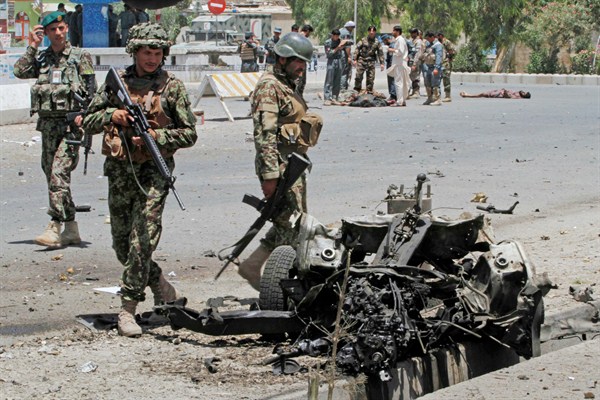While the world's attention this week was focused on Gaza and Ukraine, security remained precarious in Iraq and Afghanistan, the two lynchpins of America's conflict with transnational terrorism. The recent elections in Afghanistan offered a glimmer of optimism, but neither the Taliban's ability nor its willingness to launch terrorist attacks has abated. There is no sign that the Afghan security forces will someday be able to defeat the movement. Meanwhile, the Iraqi military cannot reverse the advances of ISIS extremists, and there is no sign that a competent, inclusive government will emerge in Baghdad. Iraq and Afghanistan remain stark reminders that America's counterterrorism strategy, developed by the Bush administration after the 9/11 attacks and largely adopted by the Obama administration, is increasingly ineffective and unsustainable.
In a nutshell, this strategy sought the ultimate eradication of transnational terrorism, with the lead role played by national governments in the parts of the world where such terrorist groups arose. The United States would help these governments with assistance and training, and use the American military as a temporary backup when local security forces couldn't handle the job. Unfortunately, the strategy was born with deep flaws that become more and more evident over time. It incorrectly assumed that the states at the front line of the struggle shared America's priorities and goals. It overestimated the willingness of the American public to tolerate grinding military operations in far-flung places. And it did not accurately reflect the nature of the threat.
The architects of the counterterrorism strategy believed that to be effective, terrorists needed explicit or tacit state support. Hence the United States removed regimes, such as the Taliban in Afghanistan and Saddam Hussein in Iraq, that either backed or might back terrorists, and replaced them with governments expected to join the battle against terrorism. What actually happened was the emergence of fluid, transnational extremists, who learned to swarm to a point of weakness anywhere in the Islamic world and then move on if things became too dangerous, elevating traditional guerrilla tactics to a strategy. Old defenses did not work against this new style of enemy. Historically states defeated traditional guerrillas by clearing out and controlling their base areas or homeland. But today's transnational guerrillas have no specific and discernible base area. U.S. strategy remains focused on controlling territory while the enemy has transcended reliance on any specific place.

